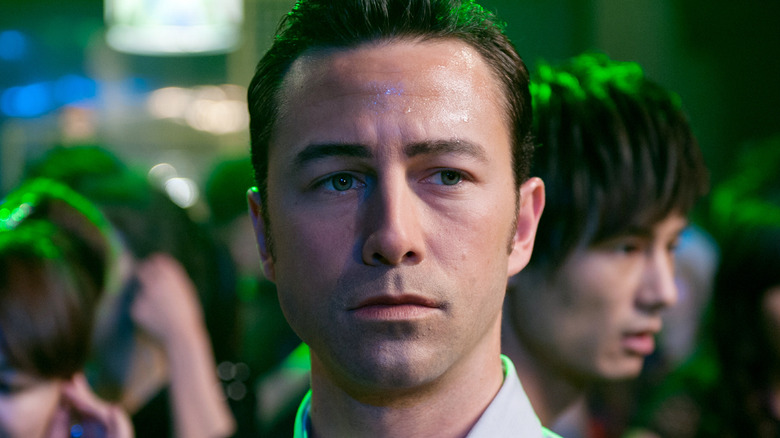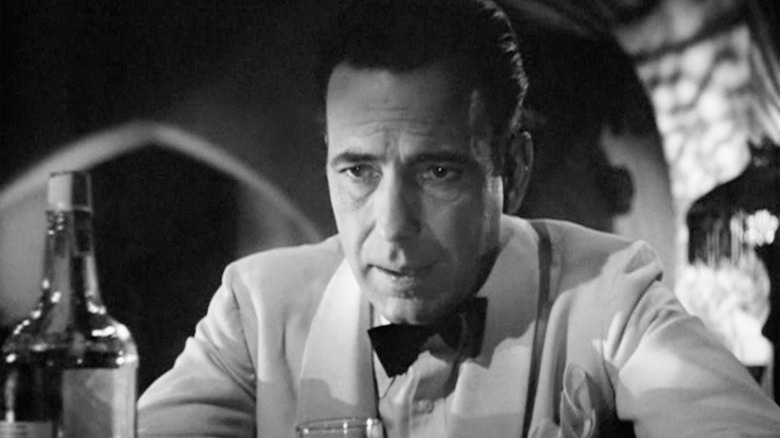Rian Johnson's Inspiration For Looper Came From A Surprising Hollywood Classic
Does the time-travel logic in "Looper" hold up when you really think about it? Nah. Does it matter? Also nah. Rian Johnson's sci-fi thriller cares very little about the practicality of its time-loops. It even lamp-shades this at one point by having Bruce Willis as the older Joe flat-out tell his younger self (Joseph Gordon-Levitt) he doesn't want to talk about time-travel and how it works. No, "Looper" is far more interested in cycles or "loops" of violence and the ways they can be perpetuated by the very people trying to end them through what they see as justifiable violence. More than that, it's about just how hard it is to break out of those cycles when you're stuck at the center of one.
The 25-year-old Joe is trapped in such a cycle himself when "Looper" begins. It's the year 2044, and the younger Joe is making his living as a Looper: An assassin who works for crime syndicates from the future that send their enemies back in time for him to kill and dispose of (preventing the bodies from being tracked back to them). Times are tough, to put it mildly, which is the reason Joe wound up in this lucrative, immoral profession to begin with. It's virtually impossible to step away from this criminal business, either. Even if these Loopers manage to survive the next 30 years, their older selves are then sent back in time for their younger counterparts to kill, thus closing the loop.
Where did Johnson (who both wrote and directed "Looper") come up with the idea for Joe's mind-bending dilemma? You might be surprised by the answer he gave NPR in 2012:
"Our main character, Joe, much like a movie I looked to for inspiration was 'Casablanca,' much like Rick in 'Casablanca,' he's beginning the movie in a very kind of isolated, self-serving place. And it made sense, much like in 'Casablanca,' to build a world around him where you saw that that kind of selfishness didn't come from him being a bad person, but was because he has to exist in this world."
Here's looking at you, kid
Humphrey Bogart famously starred in "Casablanca" as Rick Blaine, a U.S. expatriate who makes his living running a nightclub in the titular Moroccan city during WWII. When his former lover Ilsa Lund (Ingrid Bergman) unexpectedly re-enters his orbit seeking passage to America for her husband, a Czech resistance fighter, the cynical Rick is forced to decide if he should take advantage of the situation to serve his own selfish desires or risk sticking his neck out to help Ilsa. One way or another, you probably already know that director Michael Curtiz's 1942 classic ends with Rick doing the selfless thing before bidding Ilsa farewell with the iconic line, "Here's looking at you, kid."
Joe does, in fact, have a similar arc in "Looper." Upon failing to kill his older self (aka "Old Joe") when he's sent back to 2044, Joe learns that Old Joe has a plan to change his fate and save his future wife ... er, Joe's future wife. (Time-travel really is messy.) But doing so means killing a mysterious figure known as the Rainmaker when they're still a child, which would be morally-suspect enough on its own before Joe learns who the Rainmaker is and his complicity in their origins (which I won't spoil). It all culminates with Joe coming to the same realization as Rick: He has to be the one to make a selfless decision or else those he cares about will suffer.
Fittingly, "Casablanca" and "Looper" end on a shared note of cautious optimism. The former concludes with Rick vanishing into the fog with his associate Captain Louis Renault (Claude Rains), a perfect visual metaphor for their uncertain future. (That the movie came out when WWII was ongoing only adds another layer of meaning to its final shot.) "Looper" likewise wraps up without revealing if Joe's sacrifice prevents the Rainmaker from going down a path of darkness when they grow up. Still, it leaves the door wide-open to the possibility, which is as hopeful an ending as a film like "Looper" could have without feeling dishonest.

